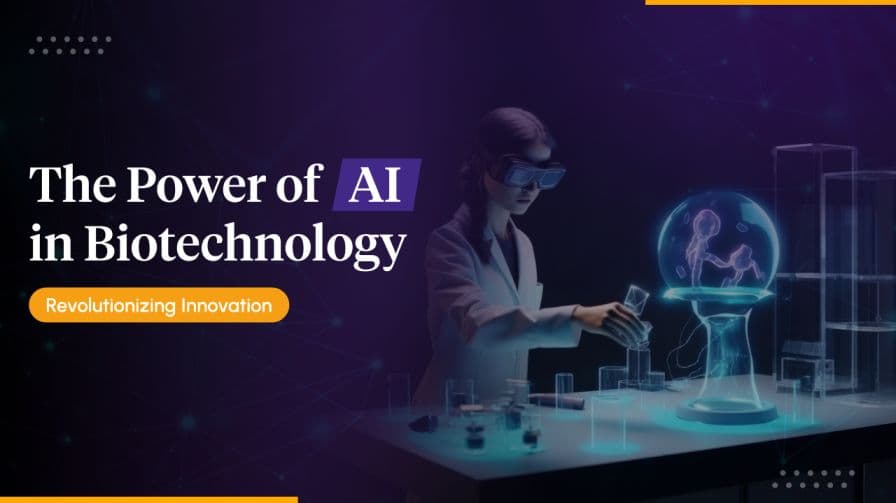Published: July 23, 2024
Discover how AI is transforming the biotech industry?

The world is always on the journey of improvement. Therefore, it is happy to change and adapt to new circumstances for the best results. One example of this is how people around the globe are happy to adopt the latest technology with its flaws to improve their living standards. Now, artificial intelligence is one such example. Before, it was a thing of the future; now, it is the truth, and people are more than willing to embrace it. How they do it is a whole different matter. In this post, we will be discussing how the biotechnology industry is using its preferred AI service company to create unique solutions.
In this post, we would be covering what all is included in the biotechnology and AI services. Then, we will focus on how the two can work together to revolutionize the world we live in.
A Brief Introduction of Artificial Intelligence for the Uninitiated
In the most basic sense, artificial intelligence is a sector dedicated to creating ‘intelligent’ machines. The AI field came into existence back in 1956 with the aim to define intelligence so precisely that machines could simulate it. Now, we have artificial intelligence, machine learning, and deep learning; though still in the infant stage, it is a start.
Artificial Intelligence
AI is an umbrella term that includes the creation of intelligent systems capable of performing human intelligence tasks like problem-solving, decision-making, and learning.
Machine Learning
ML is a subsection of artificial intelligence where the top AI development companies train computer systems to perform tasks without any explicit instructions, by leveraging patterns and insights from the data.
Deep Learning
DL is a subset of machine learning that uses artificial intelligence neural networks to make decisions. It is an excellent tool to analyze large amounts of data, including images and text.
Now that you understand the various sections of AI and ML solutions let us determine how to leverage them for biotechnology.
What is Biotechnology & its Various Types
Biotechnology is the branch of science aimed at combining both biology and technology to improve people’s quality of life. This field is focused on using living cells or their components to meet specific aims.
As a multidisciplinary area, biotechnology is a field applied to food sciences, pharmaceuticals, agriculture, and forestry sciences. Currently, biotechnology has resulted in improved medicines, more productive crops, and better materials.
The Various Types of Biotechnology are:
- Marine Biotechnology
- Pharmaceutical Biotechnology
- Animal Biotechnology
- Molecular Biotechnology
- Plant Biotechnology
- Industrial Biotechnology
- Medical Biotechnology
- Environmental Biotechnology
Biotechnology Based on Color – As per Area of Research
Another way to group biotechnology is through colors based on the area of research
Red Biotechnology – The health branch that is focused on vaccines, drugs, gene therapy, etc.
Green Biotechnology – The agriculture sector is dedicated to creating better crops, protecting them from the weather, and combating pests.
White Biotechnology – Linked to the industrial sector and studies the manufacturing and development process of biofuels, with the aim of making the industry more sustainable and efficient.
Yellow Biotechnology – Includes research on the production of food to reduce saturated fat levels, modify calorie intakes, and supplement vitamins.
Brown Biotechnology – Treatment of arid and desert soils by focusing on species resilient to dry and saline soil.
Blue Biotechnology – Understanding the seas and oceans to get health, cosmetic, or aquaculture products.
Gray Biotechnology – Studies the preservation and recovery of natural ecosystems that have gone through changes due to contaminants.
Gold Biotechnology – Covers bioinformatics, and includes the analysis of biological processes like DNA sequences, amino acids, etc.
Black Biotechnology – Bioterrorism and biological warfare are also possible with biotechnology, and black biotechnology is research into these subjects.
Orange Biotechnology – It is the area of learning in biotechnology that was created to attract future scientists.
Purple Biotechnology - Studies related to legal aspects of biotechnology, including safety measures, patents, and data protection.
Now that we have listed the various types of biotechnology, it is time to look at how artificial intelligence and biotechnology work in unison to improve results.
Does the Combination of Biotechnology and AI Service Company Save Lives?
So, let us first determine if it is a good idea to mix AI services companies with biotechnology. The fact is that human needs are changing fast, and we are depleting the resources we have at a rate that would prove catastrophic if the right steps are not deployed soon. Be it health, the environment, or industries, the inclusion of AI can help. Businesses need to incorporate the technology to stay relevant, as several companies in the biotech world are already leveraging the technology to produce better quality drugs, identify and change gene patterns, correctly diagnose ailments, prevent live-altering diseases, and more.
Additionally, and among the more important reasons to incorporate AI with biotech is that it facilitates quicker sharing of information, allowing different players to work together irrespective of where they live. This change allows for quicker discoveries and faster deployment.
What is the Role of AI Service Company in Revolutionizing the Biotechnology Industry?
As every biotech organization hires an AI service company to assist them, the biotech world is revolutionizing. Now, these organizations are leveraging big data, AI, and ML technologies to advance their research. The two sectors are highly compatible, biotech already has tech in it, and we all know what AI is.
In the case of biotech, AI is not limited to automating repetitive tasks. It has the potential to assist with research, improve daily tasks, help with data analysis, drug manufacturing, and more.
Here are some ways in which biotech is using artificial intelligence services to their advantage:
Red Biotechnology (Health):
Drug Discovery: AI can analyze vast datasets of molecular structures and patient data to identify potential drug candidates and predict their efficacy, accelerating development.
Gene Therapy Design: AI can design more precise and effective gene therapies by simulating their interaction with human cells.
Diagnosis and Treatment of Mental Illnesses: Mental illness currently affects 13% of the world’s total population. With biotechnology, early detection of mental illnesses and preventive care or treatment is possible.
Green Biotechnology (Agriculture):
Crop Improvement: AI can analyze genetic data to develop crops with increased yield, improved resistance to pests and diseases, and better tolerance for harsh weather conditions.
Precision Agriculture: Analyzing soil and weather data to recommend optimal planting times, fertilizer application, and irrigation strategies is possible with artificial intelligence.
White Biotechnology (Industry):
Biofuel Production: AI can optimize biofuel production processes by identifying more efficient enzymes and fermentation methods.
Biodegradation: Designing enzymes that break down pollutants more effectively, aiding in bioremediation efforts is becoming a reality thanks to the inclusion of AI in biotechnology.
Yellow Biotechnology (Food):
Nutritional Design: AI can analyze food molecules to create healthier foods with reduced saturated fat, optimized calorie content, and enhanced vitamin profiles.
Personalized Nutrition: AI can help assess an individual's health data to recommend personalized dietary plans.
Brown Biotechnology (Soil):
Microbiome Analysis: Assessment of the soil microbiome with artificial intelligence services can help identify bacteria and fungi that improve soil health and drought resistance.
Plant-microbe Interactions: AI can model the interactions between plants and beneficial soil microbes, leading to better strategies for promoting plant growth.
Blue Biotechnology (Marine):
Drug Discovery: AI can analyze the vast genetic diversity of marine organisms to identify novel drug leads for treating various diseases.
Aquaculture Optimization: Optimizing aquaculture practices by predicting fish growth patterns, disease outbreaks, and optimal feeding strategies is possible with artificial intelligence.
Gray Biotechnology (Ecosystem Restoration):
Contamination Detection: AI can analyze satellite imagery and sensor data to identify areas with environmental damage and prioritize restoration efforts.
Species Identification: AI can automate species identification from images and videos, aiding in ecological monitoring.
Gold Biotechnology (Bioinformatics):
Protein Folding Prediction: AI can predict the 3D structure of proteins from their amino acid sequence, accelerating drug discovery and protein engineering.
DNA Analysis: Analyzing large-scale DNA sequencing data to identify disease-causing mutations and personalize treatment plans is also possible with artificial intelligence.
Purple Biotechnology (Legal and Ethical):
Patent Analysis: AI can be used to analyze patent data to identify potential infringements and opportunities for collaborative research.
Risk Assessment: AI can analyze experimental data to predict potential safety risks associated with new biotechnologies.
Orange Biotechnology (Education):
Interactive Learning: AI can create personalized learning experiences for students interested in biotechnology.
Chatbot: Chatbot development services can play a huge role in making relevant information more accessible to all the parties.
Virtual Labs: AI can power virtual labs that simulate experiments and provide safe learning environments.
Black Biotechnology (bioterrorism):
It is a destructive application of science, and AI services companies would not be involved in such activities.
How Do Biotech Companies Utilize AI in Driving Innovation?
Companies are using the generative AI services from artificial intelligence companies to drive innovation in a variety of ways. These are the following ways in which biotech companies leverage AI in driving innovation.
- They help speed up innovation and analytics in all research work.
- The AI and ML solutions can help with the making of new vaccines and drugs.
- It is making personalized medicines a reality.
- AI is assisting with selective breeding.
- Genetically modified and hybrid plants are not new discoveries, but the inclusion of AI accelerates the process.
These are only some of the ways that biotechnology is benefiting from AI services companies. The fact is that AI can contribute to every aspect of biotech industry operations. So, if you have a reason to believe that a specific pain point will be eliminated with artificial intelligence, then get in touch with an AI consultancy company today. They would be happy to check the viability of your vision before helping you turn it into a reality.
The Future of Biotechnology – How Are AI & ML Changing the Landscape?
Biotechnology is a field that relies heavily on research and development. These are laborious, expensive, and time-consuming tasks that require extensive knowledge. With the incorporation of AI, ML, deep learning, and other technologies, it is easier to gain momentum and enhance productivity.
Biotechnology is becoming more essential in today’s world as it can improve human life quality and the environment. The various applications of the industry and the need for change are two factors that are propelling these businesses to opt for AI and ML technology and improve their operations.
AI Service Company – Making Innovation Faster for Biotechnology Companies
The Biotech world needs to innovate faster to meet the ever-growing demand of today’s world. The use of their preferred AI service company can help make the process faster and ensure that they have the best possible outcome every time.
Faster life-saving drugs, early disease detection, and tailored treatments – all of these can become realities with AI in biotech. The revolution promises to improve global health and unlock the potential of biological data.
If you too would like to leverage the AI/ML solutions for your benefit, then get in touch with us today. We would be happy to discuss the various applications of AI solutions in biotech and find the most appropriate method of assisting you innovate faster and better.

Anil Rana
A Solutionist, Anil Rana is an avid tech aficionado and wants to keep up with everything happening around and in the IT world. Calling him a Jack of All trades with mastery in the analysis will not be an exaggeration. As a tech enthusiast, he focuses on solving problems by analyzing them and relying on Logic.
Recent Blog Posts
No recent blogs available.